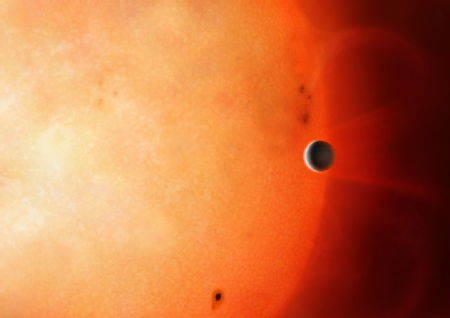There is a huge variety of planets in our galaxy. A particular class of planet that has been missing is the so-called hot Neptunes. These are planets bigger than Earth but smaller than Jupiter, that orbit their star very closely.
Astronomers call this apparent scarcity the “Neptunian desert” and evidence suggests that this absence is due to most planets evaporating away. But recently, a new object has been found in the Neptunian desert, and its properties are so peculiar that the international team has nicknamed it “forbidden”.

NGTS-4b, its technical name, has 20 times the mass of Earth and a radius 20 percent smaller than Neptune. It orbits its star in just 1.3 days and has a temperature of 1,000°C (1,832°F).
According to the new study, the planet is being bombarded by X-rays and extreme ultraviolet photons, and researchers estimate that it might be losing about 10,000 tons of its atmosphere every second.
This high number, about 10 times higher than GJ 436b, combined with the fact the planet has apparently survived the eons when the star was more active is truly impressive. The team suggests that either the planet migrated inward recently or that it must have a large dense core whose gravity has fought well against the powerful light of its star.
“This planet must be tough – it is right in the zone where we expected Neptune-sized planets could not survive,” lead author Dr Richard West from the University of Warwick explained. “We are now scouring out data to see if we can see any more planets in the Neptune Desert – perhaps the desert is greener than was once thought.”
“It is truly remarkable that we found a transiting planet via a star dimming by less than 0.2% – this has never been done before by telescopes on the ground, and it was great to find after working on this project for a year,” Dr West said.
A planet not at its place… These new astronomy results will probably relaunch the Planet 9 discussion and its search in our solar system.











